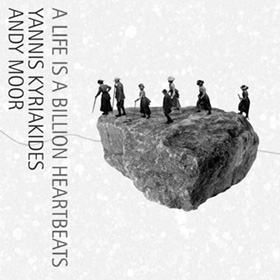Compact disc, 2015, Unsounds 47u; available from Unsounds, Windtunnelkade 10 1059 BZ, Amsterdam, The Netherlands; telephone: +31 203200279; http://unsounds.com/shop/index.php?route=common/home.
Reviewed by Seth Aaron Rozanoff
Glasgow, Scotland
 A Life Is A Billion Heartbeats is a montage of pre-recorded Greek Rebetika vocals and musical fragments, complimented and enhanced with a dense layering of electronic processing techniques. Yannis Kyriakides and Andy Moor have created twelve effective tracks based on the underground Greek Rebetika tradition of the 1920's and 1930's.
A Life Is A Billion Heartbeats is a montage of pre-recorded Greek Rebetika vocals and musical fragments, complimented and enhanced with a dense layering of electronic processing techniques. Yannis Kyriakides and Andy Moor have created twelve effective tracks based on the underground Greek Rebetika tradition of the 1920's and 1930's.
Early on, a dialogue is formed between Moor's guitar playing and Kyriakides' management of electronic sequences generated on a laptop. The strategy here is built upon selected Rebetika tunes, upon which the duo improvises. The sound complex develops from Moor's idiosyncratic manner of playing that reflects the Rebetika, and in a way that works with the real-time decisions Kyriakides makes on his laptop. The resulting texture is symphonic in complexity, as an augmentation or reworking of the 'instrumental' contribution. This release contains a combination of composed and improvised ingredients, demonstrating Kyriakides' versatility as an electronic musician.
In the first track, Today is the Same as Yesterday, the electronic sounds compliment and add to the various guitar layers. Repeated melodic fragments maintain an expressive continuity. For track two, Wasting Away, the laptop-generated sequences act as an accompaniment for Moor's playing, whereas in the third track, Underground Migration, we hear a dialogue between Moor and Kyriakides, via an interlocking rhythmic counterpoint. Moor's guitar playing mimics the noisier, more aggressive punctuations of sound in the electronics. Here the processing is quite robust, but the core of the track is its rhythmic pulse.
Everyone Should Think of Their Final Breath is structured in a traditional manner, where the electronics and guitar dramatically support a vocal line. But the vocal line is performed by the laptop. This track is best described as electric Rebetika, where the countermelodies are electronic sound events. This track showcases the versatility of the duo, with a full musical range found in the layering of vocals, rhythmic pulse patterns, electric guitar, and bold processing throughout. It is quite a dense track, and musically very rich.
The track Day Two, contains noise-infused sequences in the electronics, wherein the guitar periodically enters and exits this texture, and Kyriakides interjects fragments of soloistic bouzouki lines. Another interesting feature is the variable speed playback of a cassette tape player containing these lines. The bouzouki is a long-necked mandolin, commonly found in traditional Greek folk music.
Doorways Make You Forget, has a very solid rock feel. This composition is scored in song form, where an instrumental section directly answers the vocal sections. We hear an A-B form throughout this track.
Track seven, Slanging Match, has a similar pattern that is also found in track three, where a rhythmic pulse, functions as a kick drum underneath Moor's harsh, distorted guitar riffs. Modern electric guitar idioms have been integrated uncompromisingly in this track. Kyriakides counteracts the guitar part with granulation and noise bursts.
The track Billion Heartbeats very much lives up to the title of this disc. Kyriakides employs an approach to layering small micro-figures in both the electronics and guitar parts. These micro-figures gradually transform over time via some basic studio techniques including filtering, reverb, and noise.
In tracks seven and eight, the duo seems to break free from the restrictions of the Rebetika form, through improvising and creating their materials from a collaborative dialogue. This Summer, track nine, contains minimalist, pulsed music in the electronics, supporting the tuneful guitar playing of Moor. Vocals are briefly interjected, signaling a counter melody from Moor. The duo improvises the second half of the track, layering noisy sounds in rhythmic counterpoint. The layers seem to degrade as the track ends, leaving the minimal pulse that was heard at the beginning.
Track ten, Psyche, utilizes delicate and refined processing techniques. There are extreme contrasts of blurred noise in addition to the delicate sounds. These sounds increase in density, coupled with heavier gestures introduced by the guitar. This track is a type of musical fantasia that represents a free-spirited character.
Light Sleep lives up to its name with the inclusion of dream-like ambience. The guitar and electronics blend in a way wherein it is difficult to tell who is playing at any given moment. There is also a sense of drama in how the players are situated in relation to each other, producing an illusion of causality. The drowsy quality is caused by a variety of tempo adjustments, found throughout the track.
The last track, Hell Breaks Loose, reverts back to Rebetika, but with highly degraded vocals. At first we hear a thick, entirely electronic texture. Later Moor blends into this sound mass in an effective manner.
This album is a beautiful demonstration of balancing Rebetika melodies, real-time electronic processing, and pre-recorded fragments. When the distinct vocal characters are interjected, it highlights a track, further expanding the sonic depth of the duo.